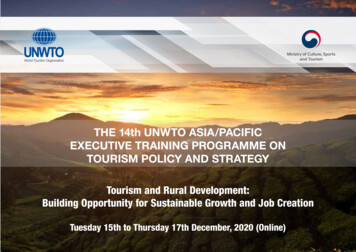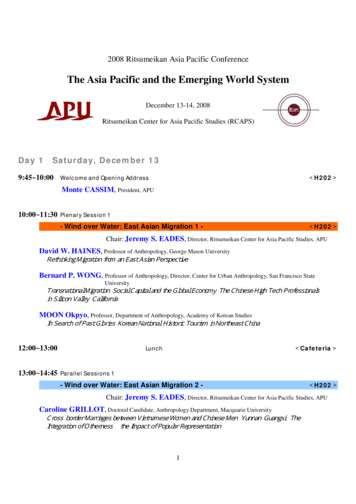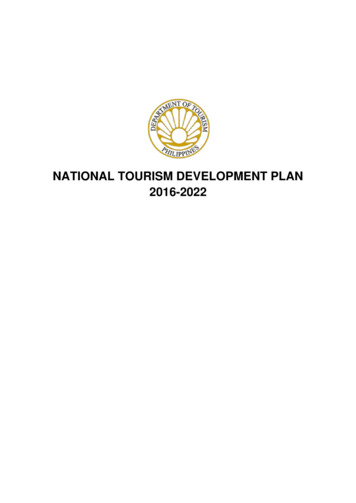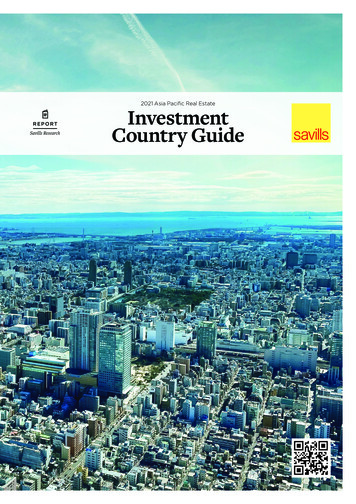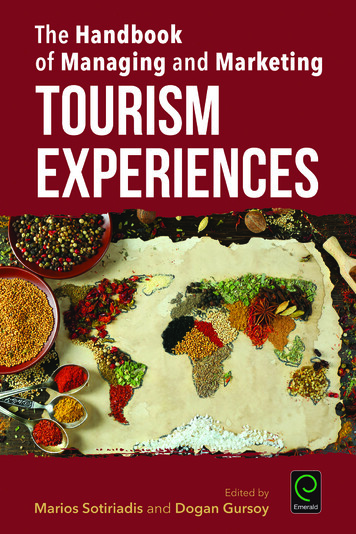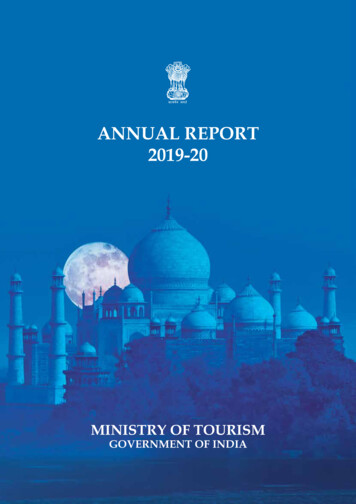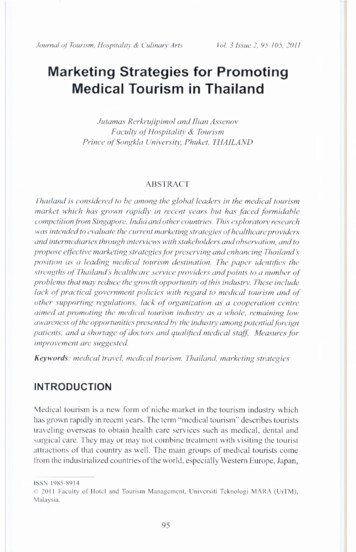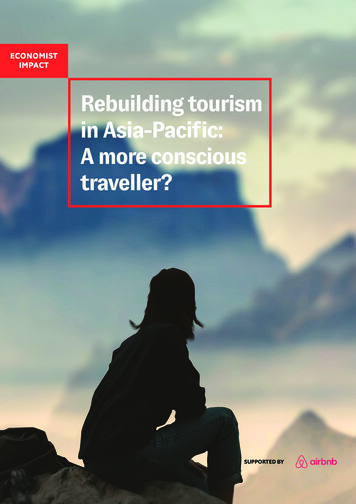
Transcription
Rebuilding tourismin Asia-Pacific:A more conscioustraveller?SUPPORTED BY
Rebuilding tourism in Asia-Pacific: A more conscious traveller?2PrefaceThis report by Economist Impact, and sponsored by Airbnb, explores therecovery of tourism in the Asia-Pacific region. It looks at ways in whichtravel could change with the rise of the conscious traveller. The report isbased on extensive desk research and a survey of more than 4,500 travellersfrom across the region. The report was written by Siddharth Poddar andedited by Pratima Singh.We would like to thank the following contributors for providing additionalinsights: Soity Banerjee, independent travel writer and project editor, OutlookResponsible Tourism Initiative Gaurav Bhatnagar, director, The Folk Tales Rachel Dodds, director, Sustaining Tourism and professor, RyersonUniversity Randy Durband, chief executive officer, Global Sustainable TourismCouncil Philip Goh, regional vice-president, Asia-Pacific, International AirTransport Association Freya Higgins-Desbiolles, lecturer of tourism management, University ofSouth Australia’s Business School Seul Ki Lee, director, LINC Project and associate professor, SejongUniversity Liz Ortiguera, chief executive officer, Pacific Asia Travel Association The Economist Group 2022
Rebuilding tourism in Asia-Pacific: A more conscious traveller?3Table of contents4Executive summary7Rebuilding tourism in Asia-Pacific: A more conscious traveller?7Who is the “sustainable traveller”?9Overtourism takes a backseat10 More than a passing fad11 Travellers go off the beaten track12 A community-centric approach to travel14 Expanding the meaning of sustainable travel16 Technology reshapes travel17 Accelerating sustainable innovation18 Expanding access through technology19 The future of travel19 Government leads the sustainable revolution20 A road paved with good intentions The Economist Group 2022
Rebuilding tourism in Asia-Pacific: A more conscious traveller?4Executive SummaryCovid-19 has changed travel in many ways. Sincethe onset of the pandemic—which has had adevastating impact on human life and society—travellers are thinking more about the impacts oftheir holidays on communities, local economiesand the environment. Although these discussionspicked up in the past few years, the pandemichas resulted in a travel awakening of sorts andaccelerated the push towards more conscious,responsible travel in Asia-Pacific.An Economist Impact survey of more than 4,500travellers in the region—across Australia, Japan,India, Malaysia, the Philippines, Singapore, SouthKorea, Taiwan and Thailand—shows that morethan 7 in 10 (71.8%) respondents agree thatcovid-19 has changed the way they think aboutsustainable tourism by making it more importantto them.The numbers are even more striking in somecountries, with 98.5% of respondents in thePhilippines, 96.5% in India and 93.5% in Malaysiasaying the pandemic has changed the way theythink about sustainable tourism, and well overfour in five citing the need for more sustainabletourism practices.1Could we be witnessing the dawn of a periodof more conscious travel?1 Our survey resultscertainly suggest so, with well over half (57.1%)saying they think differently about tourism andhow to do it sustainably, especially as it relatesto the local economy, communities, cultures andthe environment.Conscious travel takes centre stageThe vast majority of our respondents say it’simportant that their travel creates a positiveimpact for locals. When we peer closer at thedata, we find that 57% of tourists want to avoidcontributing to overtourism, while 69.9% saythey are likely to avoid travelling to crowdeddestinations. A similar percentage (71.7%)are saying they are more likely to travel todestinations that allow them to avoid crowdedspaces.This is a recurring theme in our interviews withtravel industry experts who see a clear desireamong travellers to visit places that are lesscrowded and have more space. It is thereforeunsurprising that 49% of respondents say theywill travel more frequently to rural locations thatare not very popular among tourists, a moveThrough this research, the terms “conscious travel” and “sustainable travel” are used interchangeably. The Economist Group 2022
Rebuilding tourism in Asia-Pacific: A more conscious traveller?that naturally overlaps with the quest for moredomestic travel.Our survey indicates that, going forward, a goodchunk of travel budgets will go towards domestictravel, with 57.6% of respondents saying they willallocate a greater share of their travel budgetsto domestic travel in pursuit of experiences offthe beaten track. These unorthodox experiencescould have a related impact on the diversity ofavailable tourist experiences and destinations,and reduce the pressure on popular locations.Part of this renewed focus reflects in aheightened consciousness among most travellersfor the need to factor in communities that arein need of economic recovery where they travel,and how they spend their money.It isn’t just about the economics and livelihoods.Almost two-thirds (63%) want to use travelas a way to meaningfully connect with othercommunities and cultures. These travellersexpress a desire to be more conscious aboutfamiliarising themselves with the needs andrequirements of local communities.Understanding sustainability holisticallyWhenever there’s talk of sustainability in tourism,much emphasis is placed on environmentalaspects such as avoiding single use plastics orreducing one’s carbon footprint. Our survey,however, shows that travellers in Asia-Pacific arethinking about sustainability in travel in a holisticway. To illustrate, when asked what the twomost important aspects of sustainable tourismare, economic aspect (46.7%) and social aspects(41.3%) came out on top ahead of environmental(32.1%), and cultural (31.6%) and community(21.5%) considerations.Prior to this unprecedented moment, the travelindustry—from customer to company—haslargely centred questions of sustainability aroundthe economy or environment. Increasingly,however, we see evidence that travellers are5also thinking about how they can make betterchoices that take into account the needs of localcommunities, economies, cultures and heritage.We might think of this as the advent ofregenerative tourism, where travellers attempt tobalance their desire for exciting experiences withthe potential impact on the greater ecosystem.Travelling sustainably with technologyTechnologies—both basic and emerging,innovative ones—are shaping travel behavioursand habits and strongly supporting the pushtowards more sustainable tourism practices,our survey finds. A very substantial 86.9% ofrespondents agree that technologies are enablingor can enable sustainable tourism.Whether it is travel operators being enabled toadopt more sustainable practices, or travellersbeing able to make more informed choices whenthey travel, technology is enabling sustainable,conscious travel. This is happening in multipleways, but generally speaking, operators andtravellers are using technology to disseminateand access information near-instantaneously.According to our research, almost half (43.1%) ofrespondents say technology makes the tourismindustry more inclusive by enabling more localstakeholders to benefit.Technology can be a great tool in supportingmore sustainable travel practices in the yearsto come, and covid-19 has catalysed theimplementation of some of these technologies,providing a peek into what the future of travelcould look like.The future of travelMost travellers are thinking more deeply aboutthe implications of their travel choices, with amajority (54.5%) saying they are willing to a paya premium for tourism experiences that supportsustainable practices. Conversely, a similar shareof travellers expresses a willingness to avoid The Economist Group 2022
Rebuilding tourism in Asia-Pacific: A more conscious traveller?destinations that fail to address sustainabilityrelated issues.Our research makes evident travellers’ desireto be more conscious in their travel choices,but translating this intent to real change on theground necessitates a strong commitment onthe part of all stakeholders, from tourists tooperators and local governments. Conscioustravel choices cannot be made in a vacuumbecause these decisions are related to whatoptions are available, from transportation,accommodation, food and waste services, andbusinesses’ commitment to sustainable practices.6There are some hopeful signs for change, asseveral governments across Asia-Pacific areplaying key roles in terms of greater stakeholderengagement and better communication andplanning.But old habits die hard, goes an adage. Once theimpacts of the pandemic—and the memory ofit—recede, it is possible travellers will fall backinto the same habits once again.The rise of the conscious traveller in the AsiaPacific region provides an opportunity to rebuildtourism in a holistic, sustainable manner. It is anopportunity that must not go abegging.This is why governments and operators musttake an active role in reshaping the industry. The Economist Group 2022
Rebuilding tourism in Asia-Pacific: A more conscious traveller?7Rebuilding tourism in AsiaPacific: A more conscioustraveller?Tourism and travel have played a major rolein defining the modern era—by opening upcommunities and economies, broadening ourunderstanding of not just our world but alsoeach other. Growing incomes, the proliferationof low-budget airlines and the role oftechnology in disseminating information aboutnew destinations, all resulted in a surge intravel.However, the spread of the covid-19 virusclosed the door on international travel, leadingto a major impact on a thriving industry. Allregions across the world recorded huge slumpsin the number of international tourists, withAsia-Pacific registering the biggest hit, an 82%drop in 2020 compared to 2019.2Those are devastating numbers for a regionwhere the travel and tourism industry is amajor growth driver and job creator. Accordingto Liz Ortiguera, chief executive officer of thePacific Asia Travel Association (PATA), theAsia-Pacific’s tourism economy was the fastestgrowing in the world, contributing around10% of the region’s overall GDP and over 180million jobs in 2019.2“Despite the pandemic, Asia-Pacific remainsthe largest region for the sector’s employmentemploying 55% of the global travel andtourism workforce,” she says.The onset of covid-19, however, sparked anindustry-wide reckoning that we are only justbeginning to understand.Who is the “sustainable traveller”?The perception of what a “traveller” looks likehas changed. “From a recent study I did, thereare three types of tourists. First, there’s peoplewho don’t care at all; then, there are those whowill do the easy thing; and finally, there’s the‘sustainable tourists’,” explains Rachel Dodds,the director of Sustaining Tourism and aprofessor at Ryerson University. “[Sustainabletourists] will change their behavioural stylesbecause of their beliefs or values or becauseit’s the right thing to do.”Sustainable tourism isn’t just a buzzword butan approach for thinking about how travelcan positively impact local communitiesfrom economic, health, cultural and 2021/05/covid-19-travel-tourism-virtual-reality/ The Economist Group 2022
Rebuilding tourism in Asia-Pacific: A more conscious traveller?8Today, conversations around sustainabletourism have taken centre stage: an EconomistImpact survey of more than 4,500 travellersacross Asia-Pacific3 finds that more than half(52%) of respondents say sustainable tourismis very important to them, with just 2.5% whosay it isn’t at all important.Figure 1: Everyone’s talking about sustainable tourismHow important is sustainable tourism to you? Please select one.(%)02040608010087Important11Neither important nor unimportant3Not importantSource: Economist Impact.There are differences across the region,however, with a much larger share of travellersfrom the Philippines (80.2%) and India (78.6%)saying sustainable tourism is very importantto them, reflecting Ms Dodds’ view thatthe idea of sustainable tourism—and one’sunderstanding of it—cannot be applied acrossthe board.Figure 2: The desire for conscious tourism cuts across geographyHow important is sustainable tourism to you? Please select one.(%)Important0Neither important nor unimportant20Not sia31946 1Philippines98Singapore83South KoreaTaiwan608311498979Thailand321991381Source: Economist Impact.Similarly, there is a variance in opinion alonggenerational lines: while 62.1% of millennialand 55.5% of generation Z respondents saysustainable tourism is “very important” to3them, only about a third (33.6%) of babyboomers feel the same way. This isn’t to saythat sustainable tourism isn’t importantat all to baby boomers, for 44.4% of themMore than 4,500 respondents were surveyed by Economist Impact in October 2021, from Australia, India, Japan, Malaysia, the Philippines, Singapore, South Korea,Taiwan and Thailand. The respondents were drawn from different age brackets, with 50% comprising millennials and Generation Z, and the other 50% comprisingGeneration X and baby boomers. The Economist Group 2022
Rebuilding tourism in Asia-Pacific: A more conscious traveller?say it is somewhat important to them. Thenot-so-subtle difference in views is likely areflection of generational divides on issuessuch as climate change, but respondents areunanimous when it comes to whether or notthe pandemic has changed how they thinkabout travel.Seven in 10 (71.8%) survey respondents agreecovid-19 has changed their thoughts aroundsustainable tourism, particularly those fromIndia (89.3%), the Philippines (85%) andMalaysia (83.9%).Overtourism takes a backseatAs part of the larger shift towards sustainabletourism, travellers are becoming more9conscious about where and how they travel.There are many aspects to sustainabletourism, from environmental and economicimpact to the ways in which internationaltravel affects local life. When it comes to howtravel is impacting local communities onevisits, sustainable tourism is about creating apositive impact.This aspect does seem to weigh on travellers’minds: more than two in three (66.8%)respondents say positive impact for locals willbe a major factor when making travel plans.Filipino travellers (80%) are most concernedabout this issue, followed by Malaysian (73.7%)and Indian (72.7%) travellers.Figure 3: Locals matterHow important is creating a positive impact for locals?(%)ImportantNot importantOn nesSingaporeSouth KoreaTaiwanThailandSource: Economist Impact.Overtourism—when a certain destinationbecomes too crowded with visitors, leadingto a cascade of other problems—was a strongconcern even before the pandemic. It issomething travellers are thinking about, oursurvey shows. More than half (57.6%) of surveyrespondents say it’s important that their traveldoes not contribute to overtourism, but theissue is of special concern among travellersfrom Thailand (66.3%), Taiwan (63.9%) andSouth Korea (63.1%).Despite the overwhelming support for lessovertourism, “there’s still a long way to go”before we fix the problem, says Soity Banerjee,an independent travel writer and project The Economist Group 2022
Rebuilding tourism in Asia-Pacific: A more conscious traveller?editor at the Outlook Responsible TourismInitiative.“Thanks to overtourism and waste and/orwater issues in popular destinations, as wellas a general increase in awareness, touristsare becoming open to doing small things likebringing back their trash or dry waste,” shesays.“But scaling sustainable solutions and makingtourism more socially- or economicallyinclusive without changing the fabric of aplace? It will take a lot of time, political willand focused communication to create a strongecosystem of sustainable tourism and find awider audience for it,” Ms Banerjee adds.More than a passing fadEcological concerns and covid-19 policieshave played a major role in contributing to themindset changes being witnessed. Possiblyself-reflection too. Randy Durband, chiefexecutive officer of the Global SustainableTourism Council, says “during the pandemic,all of our lives changed, and our thoughtprocesses changed. We’ve had time to reflecton the big picture. There’s been a lot of soulsearching, and travel has been a part of this.”Freya Higgins-Desbiolles, who is a lecturerof tourism management at the University ofSouth Australia’s Business School, visitingprofessor at Taylor’s University and adjunct10associate professor at the University ofWaterloo, suggests environmental concernslead many to consider how sustainable theirtravel is.“Here in Australia, we had the bushfire crisisat the end of 2019, and then we went straightinto covid,” she says. “If you live in big towerblocks, that ability to go to a park or greenspace has really gained value. Covid has madeus value nature more because of lockdowns,”she adds.Ms Ortiguera at PATA thinks that the shifttowards sustainable tourism was wellunderway before the pandemic. For her, covidjust “highlighted the many vulnerabilities ofour world and the many issues that the traveland tourism industry must address.”Our survey indicates sustainable tourism ismore than a passing fad. Over half (57.1%) ofrespondents say sustainable tourism practiceswill factor into their holiday plans, an outlookstrongest among Malaysian (69.2%) and Thai(66.3%) respondents. In comparison withtheir neighbours in Asia-Pacific, Japaneserespondents come across as an outlier onissues relating to sustainable tourism: theyare likelier to travel internationally rather thandomestically, and only 38.6% say they willfactor in sustainable tourism practices whenvacationing next. The Economist Group 2022
Rebuilding tourism in Asia-Pacific: A more conscious traveller?11Figure 4: The next holiday will be differentI will now factor sustainable tourism practices into my holiday plans(%)AgreeDisagreeNeither disagree nor esSingaporeSouth KoreaTaiwanThailandSource: Economist Impact.Travellers go off the beaten trackFor Ms Ortiguera, the pandemic hasinadvertently resulted in many silver liningsby reducing overtourism, and dispersing jobscreation and the economic benefits of tourismspend, while supporting discovery beyond theheavily-trodden destinations.“When rural areas become more accessible,it provides a higher quality of life for localcommunities and the overall destination byprotecting its natural resources and culturalheritage,” she says.According to Gaurav Bhatnagar, director ofThe Folk Tales, which provides rural travelexperiences in India, the impact of covid-19is, in ways, “a fallout of our unsustainablelifestyles, including the way we travelledand the rate at which we consumed naturalresources and products”.“This revelation is evident in the conversationswe have been having with our clients[travellers],” he says, and they are now placinggreater emphasis on dealing with overtourismby exploring rural areas. “One of the reasonsis to naturally maintain social distancing. Theother is to not use natural resources more thanwhat we can regenerate.”It is therefore not surprising to see a renewedfocus among travellers in Asia-Pacific to seekout rural locations beyond traditional andpopular bucket list destinations. Our surveyfinds that one in two (49%) respondents wantsto seek out more experiences in rural, lesstouristy locations. Thai travellers are especiallyenthused, with 59.2% saying they will travelmore frequently to rural locations. The Economist Group 2022
Rebuilding tourism in Asia-Pacific: A more conscious traveller?12Figure 5: Far from the madding crowdI will travel more frequently to rural locations that are not very popular among tourists(%)010203040AgreeNeither disagree nor agreeDisagree50493318Source: Economist Impact.By age group, 53.4% of millennials and50% of Generation Z respondents want tofrequent rural locations, while the share ofbaby boomers that says it will be keen toholiday beyond urban locales is 37%. Thiscould potentially due to a lack of facilitiesand creature comforts needed by seniortravellers, and in a covid context, the desireto visit destinations with sound healthcareinfrastructure.Rural travel is already seeing an upsurgein interest, thanks to covid-inspired safety,health and environmental concerns. In 2020,Vietnam’s government launched a campaignto encourage locals to travel domesticallywith cheap airfares and support for smallbusinesses,4 likely catalysing rural tourism inthe process. Similarly, the Tourism Authorityof Thailand, in 2020, launched rural tourismawards and an investment fund for localcommunities that preserve culture andheritage.5These kinds of initiatives could be a boon forlocal communities and governments severelyhit by the pandemic by opening up newsources of income through tourist spending.The overtourism debate has acquired new,more complex dimensions thanks to theincreased risks posed by covid-19, leadingmany to consciously choose to steer clear ofvery popular destinations.“Social distancing and personal hygieneprotocols could become important factorswhen tourists start to return,” says PhilipGoh, regional vice-president, Asia-Pacific atInternational Air Transport Association (IATA).Our survey finds that seven out of ten peopleare more likely to travel to destinations thatare not crowded (69.9%), while 71.7% also saythey are more likely to explore options to avoidtravelling to crowded locations.A community-centric approach to travelBut sustainable travel isn’t just aboutovercrowding; it’s also about how tourismimpacts local communities. Our surveyshows there is a growing consciousness intravellers about how their dollars can supportcommunities struggling economically due tothe pandemic. More than half the respondentssay they would factor in a community’seconomic recovery when making their travelplans and budgets, and over 60% say hias-helble-and-jaeyeon5Ibid. The Economist Group 2022
Rebuilding tourism in Asia-Pacific: A more conscious traveller?issues will be important factors in decidingwhere and how they travel in the future.Mr Bhatnagar says “travellers are askingspecifically for homestays and activities thatbenefit locals directly. This is a huge shiftbecause the traveller is becoming aware ofwhat to ask for.”For most (65.1%) of our respondents, activecontributions to the local economy are very13important. These conscious travellers expressa desire to not just contribute to rural and localcommunities, but to also learn and familiarisethemselves with local cultures as a way todevelop meaningful relationships with theresidents there. Almost six in 10 (59.5%) oftravellers say they want to serve local peoplewhile 63.3% find it important to use travelas a meaningful way to connect with othercommunities and cultures.Figure 6: Thinking localHow important is contributing to the local economy when you travel?(%)02040Important8065On parNot important602610Source: Economist Impact.Building meaningful relationships and learningabout local cultures through travel ranks highlyamong Indian (74.8%) and Filipino (74.2%)travellers in particular. Australian respondents,from a perspective of mutual solidarity, areoverwhelmingly in agreement with the idea oftravelling with the intention to support localcommunities. More than three-fourths (77.5%)say they will adopt travel practices that willcontribute to local economies in the future.This behaviour, according to Ms HigginsDesbiolles, was borne out of the Australianexperience of the pandemic. Prolonged travelrestrictions have become widely acceptedamong Australians, many of whom are lookingto “support fellow Australians by travelingmore in the regions and spending the moneyso that it stays in the economy”.Our survey finds that more than half of alltravellers plan to spend either the same ormore on their next holiday compared towhat they would have spent pre-pandemic.Moreover, 57.6% of respondents say they planto spend more on domestic tourism. Twothirds (66.7%) of Malaysian respondents saythey would travel more locally—with 65.3%of Thai and 64.1% of Indian respondentsechoing this sentiment—as would a majorityof millennials (60.3%) and parents with youngchildren. The Economist Group 2022
Rebuilding tourism in Asia-Pacific: A more conscious traveller?14Figure 7: A preference for domestic travelI will take more domestic travel moving forward than previously and allocate more of my budget on travelwithin my own country(%)Disagree0AustraliaNeither disagree nor 06323SingaporeSouth KoreaAgree53322265Source: Economist Impact.However, many of these sentiments canbe considered to be statements of intent.According to Mr Durband, reality is that therewill be a “mixed bag” of responses dependingon personal preferences and circumstance.For him, travellers will be caught between twoopposing forces: those who will push for moredomestic travel while the other will continueto encourage international travel.“As international borders were largely closedbefore some time, domestic tourism iscurrently enjoying a mini boom,” says Mr Goh.Expanding the meaning ofsustainable travelSustainability is often linked to environmentalor climate concerns, with a focus on issueslike avoiding single-use plastics and reducingcarbon footprint, but our survey finds thattravellers in Asia-Pacific have a holisticapproach to sustainable travel and arethinking deeply about their travel habits,behaviours and their implications beyond theenvironment alone.When asked to pick the most importantaspects of sustainable tourism, mosttravellers pick economic (46.7%) and socialissues (41.3%). About a third say minimisingenvironmental impacts of travel is among thetwo most important aspects of sustainabletourism for them, a still sizeable number.What stands out, however, is the diversityof views and perspectives when it comes tounderstanding what sustainability means to atraveller today. The Economist Group 2022
Rebuilding tourism in Asia-Pacific: A more conscious traveller?15Figure 8: Consciousness of different kindsWhat are the most important aspects of sustainable tourism for you? Please select up to two.(%)010203040Economic—creating equitable economic outcomesand income for locals47Social—connecting travellers to new socialexperiences and meaningful connections41Environmental—minimising negative environmentalimpacts32Cultural—showcasing unique, local and authenticculture32Community—involving and empowering communitiesto benefit from local tourism5022Source: Economist Impact.When examined across different age groups,two distinct camps emerge: the first—comprising of generation Z (52.1%) andmillennial (46.8%) travellers—says it mostabout the social aspect of tourism. Meanwhile,older generation X-ers (47.8%) and babyboomers (50.3%) are focused more oneconomic aspects of sustainability.All travellers indicate at least some concern forenvironmental (32.1%) and cultural (31.6%)aspects, suggesting that travellers aren’tthinking of sustainability as a single-issue topicbut one that encompasses myriad aspects thatinteract with one another.“Even before the pandemic, we saw amovement towards the idea of regenerativetravel that includes the preservation of localculture, environmental conservation and socialsustainability in relation to travel and tourism,”says Ms Ortiguera.While most travellers surveyed believesustainability in tourism is important, ourinterviews with subject matter expertssuggest there are differences based ongenerational or cultural lines. Ms HigginsDesbiolles, for example, says: “The youngergeneration is actually probably more attunedto responsibility and sustainability, while theolder generation and the baby boomers are abit more focused on enjoying what they have.”Similarly, in Korea, 50.8% are strongly attunedto the importance of culture as an aspectof sustainable tourism. This makes senseconsidering the soft power the country hasaccrued thanks to the global popularity of localcultural exports like K-pop music, TV serialsand films. According to Seul Ki Lee, directorof LINC Project and associate professor atSejong University, “Currently, tourism is notcontributing enough to Korea’s GDP, althoughit has great potential as an economic drivergiven the country’s widely recognised andincreasingly popular culture boom in the globalmarket, often known as the K-Wave or Hallyu.”Meanwhile, Filipino (81.9%), Malaysian andIndian (76.1%) travellers say avoiding wasteand choosing sustainable food options areimportant aspects of their approach tosustainable travel. Millennial travellers (74.7%)appear to be the group most concerned withmaking sustainable, less wasteful food choices,but there is an overwhelming consensus as tothe importance of this topic. The Economist Group 2022
Rebuilding tourism in Asia-Pacific: A more conscious traveller?16Figure 9: How we eat is how we travelFood choices that are environmentally sustainable and avoid waste(%)020Important608071On parNot important40219Source: Economist Impact.This sentiment is especially important givenfood is inextricably linked to travel, and isconsidered the most prominent type ofhospitality waste.6 Food is also central totourism: a 2016 World Food Travel Associationstudy found that 54% of leisure travellers arefood travellers, and many cite gastronomicexperience as central to their desire to goabroad.7As a result, we’re witnessing the continuedrise of “gastronomy tourism”, an activity thatlinks visitors with culinary experiences uniqueto a particular region or area. Gastronomytourism
This report by Economist Impact, and sponsored by Airbnb, explores the recovery of tourism in the Asia-Pacific region. It looks at ways in which travel could change with the rise of the conscious traveller. The report is based on extensive desk research and a survey of more than 4,500 travellers
